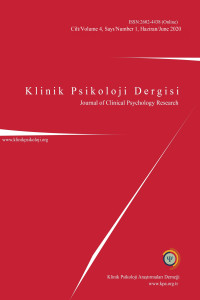Abstract
Çocuk gelişimine ilişkin literatürde annenin rolü güçlü bir yere sahipken, çocukların sağlıklı sosyal ve duygusal gelişiminde babaların önemi son yıllarda anlaşılmaya başlanmıştır. Bunun bir uzantısı olarak ceza infaz kurumlarında annelerden çok babalar bulunmasına karşın babanın hapsedilmesinin çocuk ve aile ilişkileri üzerindeki etkilerine ilişkin çalışmalar daha sınırlıdır. Bu kapsamda bu gözden geçirme makalesinde babanın cezaevinde olmasının çocuk ve aile üyeleri üzerindeki etkileri, cezaevi sürecinde baba-çocuk etkileşimi ve bu etkileşime yönelik müdahale çalışmaları ile olası çözüm önerileri ele alınmıştır. Yapılan çalışmalar babası cezaevinde olan çocukların çok sayıda stres kaynağı ile başa çıkmaya çalıştığını göstermektedir. Bu çocuklar bir taraftan baba yokluğuna alışmaya çalışırken, diğer yandan etiketlenme, değişen yaşam şartları, bozulan ekonomik koşullar gibi durumların üstesinden gelmeye çalışmaktadır. Küçük yaştaki çocukların bu süreci anlamlandırması daha zordur. Bu nedenle kendilerini suçlama ya da terk edildiklerini düşünme gibi gerçekçi olmayan inanışlar geliştirebilmektedirler. Babanın cezaevine girmesi ile tek başına kalan ve psikolojik sağlığı bozulan anne de çocuğa etkili bir ebeveynlik gösterememekte, bu durum da çocuğu olumsuz etkilemektedir. Tüm bunların bir sonucu olarak bu çocuklarda hem akademik problemler hem de duygusal ve davranışsal sorunlar daha fazla görülmektedir. Cezaevinde baba ve çocuk arasında etkili iletişimin sürdürülmesi çocuğun psikolojik sağlığını olumlu etkilerken, babanın salıverilme sonrasında ailesine ve topluma daha kolaylıkla uyum göstermesini desteklemektedir. Olumlu aile ilişkisine sahip olma babaların yeniden suça karışmalarının önlenmesinde koruyucu bir role sahiptir. Cezaevindeki babaların ebeveynlik becerileri ve daha kaliteli baba-çocuk etkileşimine yönelik müdahale programlarına katılmaları ise yararlı sonuçlar sağlamaktadır.
Keywords
Abstract
While the role of the mother has a strong place in the relevant literature on child development, the importance of fathers in healthy social and emotional development of children has started to be understood in recent years. As an extension of this tendency, although there are more fathers rather than mothers in prisons, studies on the effects of father imprisonment on child and family relations are more limited. Within this scope, the effects of father's being in prison on children and family members, father-child interaction in the prison, intervention studies for this interaction and possible suggestions for a solution were discussed in this review article. Studies show that children whose fathers are in prison try to cope with many sources of stress. On the one hand, these children try to get used to the absence of father; on the other hand, they try to overcome their situations such as labeling, changing living conditions and deteriorating economic conditions. Young children have more difficulty understanding this process. Therefore, they can have unrealistic beliefs such as blaming themselves or thinking that they have been abandoned. In addition, the mother, who was left alone with the father's imprisonment and whose psychological health deteriorated, could not show an effective parenting to the child and this situation also affects the child negatively. As a result of these situations, both academic and, emotional and behavioral problems are seen more frequently in these children. Maintaining effective communication between child and father in prison has a positive effect on the child's psychological health and supports the father's adaptation to his family and society more easily after his release. Having a positive family relationship prevents these fathers from getting involved in crime again. Participation of fathers in prison to intervention programs for parenting skills and better quality father-child interaction provides beneficial results.
Keywords
Details
| Primary Language | Turkish |
|---|---|
| Subjects | Clinical Psychology |
| Journal Section | Reviews |
| Authors | |
| Publication Date | June 25, 2020 |
| Submission Date | January 9, 2020 |
| Published in Issue | Year 2020 Volume: 4 Issue: 1 |

